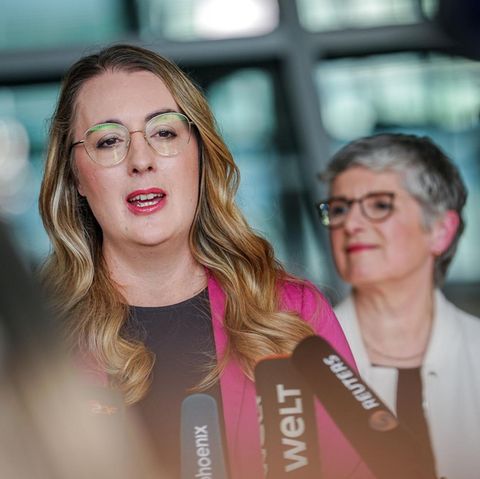Financial package
These five scenarios are available for Friedrich Merz – and as likely they are
Copy the current link
Add to the memorial list
Friedrich Merz wants to boost the economy with billions of billions and make Germany defensive. But the Greens have been blocking so far. What he can fail.
Friedrich Merz had planned everything so nicely. First the quick agreement with the SPD reached gigantic financial packages, then the Greens would already participate because it implemented whatever they wanted. And all that with the majorities of the old parliament. So his hope.
The party’s veto on Monday tore the designated candidate for chancellor from these dreams. Suddenly the entire exploratory paper hangs on the silk thread again. After all, the money is the basis of a functioning coalition, the traffic light has shown it. The Greens now want to renegotiate, but could also reject the package entirely. Or?
These five scenarios are available for Friedrich Merz
And even then Friedrich Merz’s maneuver does not have to be successful. The 69-year-old is far from being a Chancellor. These five scenarios are now available.
Scenario 1: A compromise with a few changes
CDU and SPD do a lot for that. The Greens would then consent to the constitutional changes planned by the Union and the SPD. In return, you will receive a few concessions. In this way, it could be stated in the draft law that the planned special fund should not only be invested in infrastructure, but also in “climate technology” or “climate neutrality”.
Another demand for the Greens is that this means only “additional investments”. It could be excluded that political favorite projects from the SPD and Union are financed. The three parties have signaled accommodation. The concept of defense could also be expanded, for example by adding it to cyber security and population protection.
A problem is the big time pressure. However, all of this would probably have to take place in the course of Wednesday so that the changed bill for the hearing is available. Because in the event of fundamental changes, it could happen that the opposition exists on a new hearing. This could delay the vote until the old Bundestag no longer exists. An agreement would hardly be possible.
This path is supported by the Prime Minister. After meeting on Wednesday in Berlin, these asked the negotiators to reform infrastructure, defense and country debt in one go.
Probability: rather high
Scenario 2: agreement only in the event of defense
With the special fund for infrastructure, the Greens do not want to finance election gifts for the SPD and CDU/CSU. Some of the Greens do not consider a vote on such a fortune in the old Bundestag to be necessary. Because, unlike defendings, there is no time pressure. The next Bundestag could also be about it, then probably with the help of the left. That would also improve the Greens’ negotiating position.
The SPD absolutely wants to prevent this. The population is unable to agree only on more defense spending, according to the Social Democrats. The SPD absolutely wants to decide both together. However, many in the Union parliamentary group would be very accommodating if both packages were separated. Some hopes that there would never be an agreement in the new parliament. Also because of the Union’s ban on cooperation with the Left Party.
In this case, however, the majority wobbles for Merz in the Federal Council. The Prime Minister of the SPD and CDU in particular had gotten into the special fund. A lot of money depends on the countries, at least 100 billion euros. Such an agreement in the negotiations would increase the chances that the package will burst in the end.
The green candidate for chancellor Robert Habeck insists on this position: he advises the Greens, for a no regarding a special fund: “That is why my advice would be, let’s focus on the security question,” he said on Wednesday at an appointment in Bavaria. Do the Greens listen to him?
Probability: rather high
Scenario 3: No agreement at all
If the Greens, the SPD and Union get caught in such a way that there is no agreement before the first hearing, this would not mean that from the black and red plans. Rather, the Union and the SPD would then try to push out a little more time.
Even after the first reading in the Bundestag on Thursday, an agreement would still be possible, but then other experts would have to be heard. That would cost time. Maybe it would no longer be enough to coordinate the old parliament before March 24th. The advantage: This later agreement would give the Green leaders more time to incorporate their deputies politically and emotionally.
All sides, reportedly, want to prevent the negotiations completely failed. However, the negotiating situation is not easy: the Greens want to prevent central projects of the CSU. The SPD hangs on the special infrastructure. The CDU parliamentary group is partly on the side of the Greens, the CDU Prime Minister is on the SPD website. Friedrich Merz has to bring many threads together.
Probability: rather low
Scenario 4: agreement, but fail in the vote
If there is a compromise, the majority is still not certain. Because the old Bundestag still decides. And from the three factions that are supposed to agree, around 200 MPs are eliminated. The joint buffer of Union, SPD and Greens beyond the two -thirds majority is only 31 votes.
That means: If only a part of the MEPs are with no, contains or-easier-does not appear in the Bundestag, the majority would be gone.
If you listen to the departing MPs, you can hear about understanding across the party. Some even speak of coercion. After all, 50 MPs from the CDU/CSU no longer belong to the next parliament.
With the usual instruments, former members of the Bundestag will soon hardly be disciplined. For them, it is no longer about posts, mandates or functions. You are actually only committed to your conscience.
Nevertheless, some MPs are likely to be put under pressure – for example with the argument that the political chaos of the financial package fails. Since the vote should take place in particular, everyone would be able to see who would be responsible. The hope of the faction tours: Nobody wants to be the culprit.
Probability: rather low.
Scenario 5: agreement, but the constitutional court tilts everything
At the Federal Constitutional Court in Karlsruhe, there are already several urgent requests from LINKE and AfD, both from individual MPs and factions. They initially aim to prevent the planned special meetings of the Bundestag. The plaintiffs see the rights of future members of the Bundestag violated by the planned decision. Only the new parliament is allowed to decide and must also come together faster.
However, hardly a constitutional lawyer sees opportunities for the complaints, especially since the question of admissibility arises: Why should MPs of the old Bundestag be able to sue the rights of the next parliament?
A legal statement by the Augsburg legal professor Sina Fontana for the hearing of the budget committee on Wednesday also sounds clear: “The old Bundestag is still capable of action,” says the paper that is star is present. “The new elections as a new act of legitimation in between do not weaken the legitimation of the Bundestag.” And: “The intended procedure for the planned changes in the basic law is in accordance with the constitutional requirements.”
Probability: low
Source: Stern
I have been working in the news industry for over 6 years, first as a reporter and now as an editor. I have covered politics extensively, and my work has appeared in major newspapers and online news outlets around the world. In addition to my writing, I also contribute regularly to 24 Hours World.





